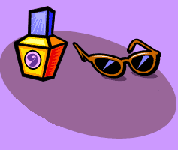|
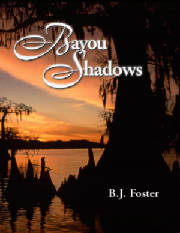
B. J. Foster, Suspense Author, Interview by Maggie Bishop
1. Tell us about your latest published book and
your current writing project.
Bayou Shadows is set in New Orleans,
before Katrina, and is an adventure filled with suspense, action and romance. For
Stacy Stimmons, a gutsy young reporter for the Times- Picayune who grew up in the
swamps, getting out of those swamps and building a career to claim her independence is a consuming obsession.
While working
on a newspaper article, she becomes involved with Ryan Townsend, a budding attorney with eyes on “cleaning-up”
Louisiana politics.
Devastation follows when Stacy discovers that Ryan is entangled in Mafia drug trafficking.
Believing
the romance is doomed, but to secure a story assignment that could catapult her career to success, she enters his world and
becomes involved in a dangerous drug bust gone bad, both become targets of the underworld.
The adventure that ensues takes them from New Orleans to Jamaica where survival depends on their wit and reliance on each other.
My current
project, Carolina Shadows, is a suspense
that takes place in the N.C. Mountains about
a young woman put on trial for the murder of her husband in Houston. She returns to the mountains, revives the horse farm that her aunt has left her only
to discover that danger has followed her from Houston and,
of course, you know that there is a romance.
2. You’ve reinvented yourself from mother to business woman
to equestrian to writer. How has
that infused your writing?
I was Executive Vice President and Comptroller for
an engineering corporation that my husband and I owned in Houston. My daughter and I decided to take up riding. Little did my husband know that he would
end up driving the trailer, mucking the stall, and cheering us on at the show ring; but he did so—magnificently.
When we sold the business and finished traveling, I
began to write. Writing allows
me to learn about anything, can be done anywhere, and what I learned from the riding world, I incorporate into my books.
3. What attracts you to writing suspense?
Writing suspense is a way of experiencing the
excitement of danger without putting myself, or my reader, in real danger. It
allows me to learn about forensics, police procedure and things that fascinate me; but the most important reason is that the
“bad guys” will get punished. In real life, this isn’t always
the case. Somewhere between the pages, the puzzle will be solved, justice handed
out, and good will triumph over evil.
4. What was the biggest lesson you learned in earning
your Masters Degree in Writing Popular Fiction at Seton Hill?
The confidence to rely on my own intuitions and knowledge in
my writing.
5. Writing is hard.
What tricks do you apply to keep going?
Go to a conference or workshop. The enthusiasm of other writers and the fact that there’s always something new to learn spurs me
on.
6. Do you plot ahead or write “by the seat
of your pants”? Why?
I use both methods. I wouldn’t drive across country without a road map. At
the same time, I wouldn’t want to give up exploring interesting places I might stumble upon along the way.
7.
When and where do you do your best writing?
My professional life gave me the “get
to work by nine” habit and it has served me well. I’m literally a
closet writer. My home at Banner Elk had an eight by ten foot closet in a guest
bedroom. Took out all the shelving, put in electrical outlets, my computer center
and did the remaining walls in bookshelves for my research materials. I don’t
sit in a chair. I sit on a big green exercise ball that keeps my back from becoming
tired. All my writer friends have to try it out when they come to the house. The best part about writing in a closet is that if company drops in, all I have to
do is shut the doors.
8.
How did you get started in writing?
My
daughter was interested in becoming a writer. There was a Romance Writer’s
Conference in Houston.
She didn’t want to go alone so she asked me. We were fortunate enough
to get to sit at the luncheon table with several well known authors and they were having so much fun discussing writing.
What impressed me most was that they were ordinary
women that had found something that they were excited about doing. I came away
with the feeling that if they could do it, so could I. I was hooked. I began taking courses, workshops, attending conferences, and reading everything I could get my hands on
about writing.
9. Of the minor characters you’ve created,
who is your favorite and why?
My stories always seem to have a crusty, wise old man.
I pattern this character after my granddad who loved to tease and had a way of imparting truth in one-line parables—whether
you liked it or not.
10. Tell us about your part of the country –
we love to travel.
Houston is a flat, fast paced city with a “can-do” attitude. We don’t miss the traffic, or the humidity and heat, but we do miss the wonderful friends and employees
we had there.
11. How did you meet your husband? (We love a romance.)
I got my husband at the place where you get all the
necessities of life—the grocery store. He was sixteen and working at the
store while I was fourteen and wearing shorts and majorette boots. I think it
was the tassels that got him.
12. What is your favorite southern food?
I love Creole cooking, whether it’s Pompano en
Papillotte or a simple Seafood Gumbo. Have been known to board a plane in Houston and go to New Orleans for lunch, stay for dinner, and fly back
to Houston that evening.
Website address: www.bayoushadows.net
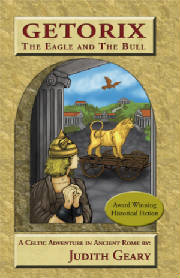
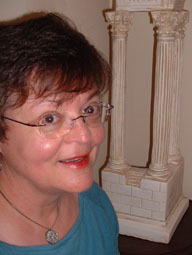
Judith Geary, Editor & Author, interviewed by Maggie Bishop
Judith Geary is an author, editor, researcher and educator.
Her first novel, GETORIX:
The Eagle and The Bull, a Celtic adventure in ancient Rome and the related curriculum are endorsed for classroom use
by the North Carolina Department of Public Instruction and the Southern Regional Education Board's Educational Technology
Cooperative (representing 16 states.) It has been internationally reviewed, was a finalist in the ForeWord Magazine Book of
the Year Awards in both the historical fiction and YA historical fiction categories. The second novel in the series is forthcoming
from IPG Books.
Judith Geary joined Bob and Barbara Ingalls in forming High Country Publishers (now Ingalls Publishing
Group) in 2001. As senior editor, she edited over 40 novels, including historical fiction by Ann Chamberlin, Cameron Judd,
Charles F. Price and Albert A. Bell, Jr. Currently, she supports historical novelists as a researcher and free lance editor.
Geary’s
background includes an MA in Education from George Peabody College and continued graduate work in writing, editing, literary
criticism. Geary teaches at Appalachian State University and presents at regional conferences libraries and schools. Website:
www.judithgeary.com
1. Tell us about your latest published book and your current writing project.
Getorix: The Eagle and The Bull is the story of a Celtic captive
in the aftermath of a battle with the Romans. When his life is spared to be a slave, at the request of a Roman general's son,
he'd literally rather die. The conflict is between Getorix and the immediate world, but by the end of the book he sees he
has choices beyond submission or death. The curriculum, Getorix's
World, grew out of my request to editor Sandra Horton to help me make the book more "user friendly" for
schools.
My current projects
include finishing up the second Getorix book (in time for the American Association of School Librarians conference in November
2009) and research on a book set in North Carolina in the late 1700s.
2. How did your free lance editing service come about?
That's a good question. It came about as a result of requests from
friends and writers referred by friends and from a need to define my current relationship with IPG Books. In the last nine
years, I’ve been responsible for every part of the book production process, from acquisitions to dealing with printers,
distributors and book store owners, so I can shepherd a book from manuscript to sales. My website for that is still in development,
but the url is: http://fosterbooks.tripod.com.
3. What
does an editor do?
Ideally, an editor helps you shape your manuscript so that the images and messages that
you want to convey get through to the reader without barriers caused by mechanics of the writing.
4. What are the three most common mistakes writers make?
*Telling in the author’s voice rather than using character
pov to show.
* Basing the characters’ actions on the author’s needs rather than making sure the character has
a plausible need of their own.
* Loving your main characters too much to make them suffer.
5. Describe your typical process in editing a novel.
First,
I'll read through the entire manuscript to get an idea of the arc of the novel, plot, character development, the genre, etc.
If I have questions about any of this, I ask the author. Next, I'll edit the first two or three chapters heavily, including detailed explanations of any changes I'm suggesting or questions I
have. I point out any "bad habits" I notice (like using the word "just" in every other sentence, depending too heavily on
adjectives or telling instead of showing.) At this point, the author and I may decide he/she wants to do a rewrite, based
on my comments, before we continue. We also establish "ground rules" for my editing -- like what kinds of things I can change
(like word order), and what to query or simply point out for the author to fix. I edit primarily using email, even for folks
I see frequently, sending sections back and forth. We may go through the entire book three or more times until both the author
and I are happy with the results.
6.
What advice do you give writers when facing re-writes.
Recognize that good writing
is rewriting. Rather than trying to do everything
at once -- one grand rewrite -- go through the novel multiple times, looking at one element each time. Computer technology
makes this easy. You can search for a particular phrase, to see if you've overused it, for a particular character, to make
sure the dialogue is consistent with the personality and development you've envisioned for them. Often we authors are not
sure of the best place to introduce a specific detail or piece of information, so we tuck it in multiple places. A search
on those key words allows us to identify the right spot and take out repetitions. A "wise reader" – someone who is familiar
with your genre, but is not a professional editor, is often your best ally in deciding where rewrites are needed.
If an
attitude adjustment is needed, try to experience the joy of honing your prose to its sharpest edge, or, if you prefer, of
spending more quality time with these characters you've enjoyed creating so that the reader can enjoy them as well.
7. What are your tips for Point of View?
The topic of point of view is perhaps the most complex writers deal with (a close second is "voice.") It generates
considerable discussion in every group of writers I’ve participated in. When writing in what is commonly known as "third
person close," you can reveal in a scene only what that character knows. Anything else reads as "authorial intrusion" and
jerks the reader out of the scene. (That doesn’t mean you can never interject information, only that there’s a
price to pay.)You can effectively manipulate the amount of information available to the reader by choosing a point of view
character for a particular scene that knows that information. It isn’t always the main character who makes for the best
pov – remember Arthur Conan Doyle’s use of Dr. Watson in the Sherlock Homes series.
Any point of view from
first person, third person close, limited omniscient to omniscient can be effective in certain situations. Reading books in
the genre you’re writing is perhaps the best way to internalize the conventions of that genre.
8. Tell us about your trips to Rome in researching your Getorix Series.
That’s a broad question. The short version is that actually walking the stones I’m
writing about was invaluable in getting a sense of the setting. For example, as heroic as the myth of old Rome is, the actual
space is rather compact. The long version is more easily available in a number of articles I’ve written for various
websites. The [Links] page of my website has a list and portals to those articles. www.judithgeary.com
9. How did Getorix come to you?
Getorix: The Eagle and The Bull, began as a short story for a class I was taking from Orson Scott Card at Appalachian State. He'd said he liked historical
fiction (even though he's one of the stars in the speculative fiction world), and used historical research for world building.
In the grand old tradition of giving teachers just what they ask for, I wrote a story set in ancient Rome. I can't say exactly
how, but the characters come first -- they always do -- the situation they face comes next, then I have to figure out the
context.
When Card said, "This is a young adult novel, expand it and send it out," I was "inspired" to do the research
and work necessary to do it right. In the process, I've become fascinated by history -- primarily the details of everyday
life (I still have to look up the dates.)
10. Tell us
something about your part of the country – we love travel.
Boone, NC is a college town and a resort area.
It has everything you’ve ever heard imagined for the Appalachian mountains – incredible scenery, skiing, equity
theater, moonshiners, gated resort communities, antique shops, mountain streams, cool summers & mild winters and wonderful
people – but don’t tell anyone, because it’s already getting a bit crowded up here.
11. Chat about your pets – we love those, too.
The animals
who share my space hardly seem like pets. They’re dependent on the fact we have thumbs and can open doorknobs and packages,
but they believe they run the show, and sometimes they do. Daisy is a rat terrier, and at 13 years old, shows no sign of slowing
down. Her consort, Bud is a mixed Boston terrier, corgi, whatever, who struggles to keep up with her. The cats, Roxanne and
Naomi, seem to take delight in waiting on the front porch to touch noses with the dogs when they’re on leashes and can’t
give chase.
12. Who is your favorite southern character?
My favorite Southern characters are real people, and there are too many of them to mention. In fiction, I particularly
enjoy Sharyn McCrumb’s books – so the latest book I’ve read has my favorites. Camber, a race car driver
in an upcoming novel, and Jesus, an Hispanic character in the same novel, are my current favorites.
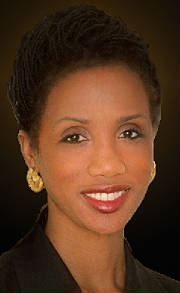
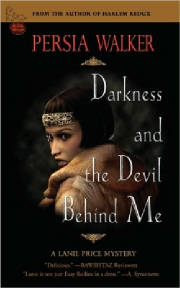
Persia Walker interviewed by Maggie Bishop
1. Tell us about
your latest published book and your current writing project. My latest published book is DARKNESS AND THE DEVIL BEHIND ME. It’s a murder mystery set in 1920s New
York against the backdrop of the glittering Harlem Renaissance. It introduces Lanie Price, a smart, sassy society reporter
who covers the good, the bad and the ugly among Harlem’s uppercrust. As the story opens, it’s 1926 and we find
Lanie hard at work on her Christmas column. She’s frustrated. Once a crime reporter, she has a hankering to do something
a bit meatier than stories about the parties of the rich. As Lanie puts it, “After a constant diet of sugar and nothing
but, even the most die-hard sweet tooth will get to yearning for a nice, substantial steak.” It’s a case of be
careful what you ask for. The sister of a woman who vanished three years earlier walks in and asks Lanie to dedicate her column
to the young woman’s memory. Lanie remembers the case vividly: Esther Todd vanished along the snow-swept streets of
a December night. The police were indifferent, but their attitude changed when thieves hit the home of Todd’s wealthy
society patron. The million-dollar jewel heist had to have been an inside job, and Todd must’ve been in on it. The case was never solved. Hoping to fresh quotes for her column, Lanie starts revisiting witnesses
and asking questions, the impertinent kind, just about guaranteed to get her killed.
2. Your resume brims with creativity. Why did you switch from drama to writing? I’ve always wanted to be a storyteller. Drama was one
way of doing that, but I didn’t have the assertiveness, the drive to push myself to be centerstage. I’ve found,
however, that everything I learned in drama is applicable to writing. Actors learn to create vivid, unique and memorable characters.
They learn to physically inhabit these characters, and bring them to life with speech and mannerisms. They learn the tenets
of good dialogue and storytelling, conflict and resolution, all necessary skills for a writer. As a matter-of-fact, I often
recommend that writers take acting lessons.
3. Describe your first "big break" in journalism. Oh, I had a couple of breaks. First, I got temp work with CNN as a scriptwriter. That
didn’t last long because I soon joined The Associated Press. Eventually, I worked at the AP Broadcast News division
in Washington, DC. It was one of the best places I have ever worked. Wonderful, creative, dedicated people. You couldn’t
wish for a better bunch. I’d say getting to work at AP Broadcast was my first “big break.”
4. What is your favorite memory from working in Munich? Hmm, another hard one. I would say that my favorite memory from “working”
in Munich was (a) hanging out at the Chinesische Turm (Chinese Tower) Biergarten. Radio Free Europe/Radio Liberty was in building
that sat snug up against the Englische Garten, Munich main municipal park. The beer garden was just inside the park. It amazed
me to see people actually leaving their desks, going outside and relaxing in the sun during their lunch break. When I worked
in the States, it was very common for me to take my lunch at my desk. I almost never left the building once I reported for
duty. I was immersed in news without break for hours on end. In Munich, I learned to take pauses and appreciate the sense
of rejuvenation they bring.
5. Where and when do you do your best writing? In bed, with my laptop on my lap. That sounds terrible, doesn’t it? It’s
a habit I’ve tried to break, but I always go back to it. When I’m really into a novel, I literally eat and sleep
with it. The laptop is always there, on my lap or at my side, when I fall asleep or wake it. The other place I enjoying working
is a public library – especially a library without wireless Internet. That’s where I go when I want a change of
scenery, and no risk of distracting myself.
6. How has your journalism experience influenced your novel writing? It’s made me aware that writing is a job. It’s a creative job, but
a job, nonetheless. That means professional expectations and deadlines. It means not waiting until the “muse”
strikes. It means getting it done and getting it done right, as much as possible, the second time around. (Not the first,
the second. The first draft is always just about getting it on paper. The second go-through is for editing.) Working for the
AP specifically taught speed and an appreciation for simple, declarative sentences. I’d say the only “negative”
side to my journalism experience is that it got me used to writing under pressure. So even today, I write best when I’m
under deadline pressure. Without some outer pressure, it’s hard to stay motivated.
7. What is your strength in crafting a novel? (character, plot, setting, etc.) Good question. Honest answer: I have no idea. I tend
to come up with very complicated plots. Nothing is ever as simple as it seems. I love complex characters, too. I’ve
been trying to simplify matters, actually. DARKNESS AND THE DEVIL BEHIND ME has a much simpler plot, for example, than HARLEM
REDUX, my other 1920s mystery.
8. Who influenced you the most in your writing career? How? You might find this an odd combination, but I’d have to say Somerset Maugham
and Jessica Fletcher. As a child, I loved reading Maugham, especially his novel THE RAZOR’S EDGE. His short stories
about British expatriates living in Southeast Asia fascinated me, too. I loved how he described nuances in character, and
the passion, or even evil, that can lurk beneath the banal. As for Jessica Fletcher, I used to watch MURDER SHE WROTE while
living in Munich. I loved that show, absolutely loved it. I especially loved the opening credits, where she’s typing
away and finishing her manuscripts. Every time I saw that, I thought to myself, “Why you can do that, too. All you need
is confidence. Just believe in yourself, and have fun. Like she does.”
9. What advice do you have for newly published authors? Start thinking of yourself as running your own business, and of your book as
your product. Respect your work, be in love with it if you want to, but develop some sense of detachment and try to see it
as others do. They have no emotional attachment to it. Publishers and booksellers see your books as products in which they’ve
decided to invest and by which they plan to earn them money. They are your business partners. Readers are your customers.
They see your books as a potential source of entertainment. Whether partner or client, they’re all worried about getting
their money’s worth. It’s your job to do make sure they do.
10. Tell us something about your part of the country – we love travel. When I was living in Munich, and people asked where I was
from, I’d say, “I’m an island girl.” They’d say, “Oh, the Bahamas, Virgin Islands, what?”
I’d say, “No, New York City. Manhattan, to be exact.” They were shocked. They would laugh. “New York
City, an island?” Many people don’t realize that New York City is composed of boroughs, one of which is the island
of Manhattan, with the Hudson River on one side and the East River on the other. As a matter-of-fact, according to the U.S.
Postal Service, Manhattan is New York City. (Whenever you send a letter to someone
in Brooklyn or Queens, for example, you write Brooklyn or Queens on the envelope. But when you write to someone who lives
in Manhattan, you address it to New York City.) Not only is Manhattan an island, but it’s a small one at that. You can
cross it by foot, from east to west, within an hour with minutes to spare if you don’t stop. Another secret? The skyscraper
section is actually quite small. Most of Manhattan has low-rise buildings. Some of that changed with the recent real estate
boom, wherein appeared high-rise condos, but for the most part, it’s still true. Manhattan is also composed of very clearly defined neighborhoods. They are miniature cities in themselves. In each,
the people eat, dress, speak, even think differently. An important point because New Yorkers tend to be highly neighborhood-centric.
Except for work and play, they’ll live in the same neighborhood they’re entire lives. So for all of our renowned
sophistication, New Yorkers (native New Yorkers, that is), are as “small town” in many ways as anyone in so-called
Small Town, America, and we’re definitively “island” people.
11. Chat about your pets – we love those, too. Back in September, I went to the ASPCA and adopted two “older” kittens,
MacPherson, a black-and-white male, and Sunday, an orange tabby female. Miki P., as we now call him, has developed into a
big bruiser. He’s a very people-oriented kitty, extraordinarily curious, loves to explore suitcases, closets, etc. He
spends hours dashing up and down the hallway or staring out the window. I wish we had a garden where he could run free. Sunday
has now gained the nickname of Cupcake. With her sweet pink nose and orange coloring, she reminds me of a strawberry cupcake.
She likes to go off on her own and sleep the afternoon away.
12. What is your favorite southern setting in a novel? I’m sure you get this answer a lot, but I have to say it’s New Orleans.
I’ve never been there, but I’ve been in love with the city ever since reading Anne Rice’s INTERVIEW WITH
A VAMPIRE. Every film I’ve seen set in the Big Easy, every item I’ve read on its history, only deepenened that
fascination. Katrina was a heartbreaker, of course, but I believe that New Orleans will regenerate. As a setting for any tale,
it’s mesmerizing.
Visit
Persia’s website http://www.persiawalker.com/
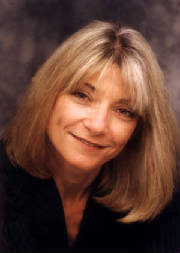

Shelley Lieber, Publishing Consultant
interview by Maggie Bishop
1. Tell us about your latest published book and your current writing project.
Released in March 2008, 4Ps to Publishing Success: Get Your
Manuscript Off Your Desk & Into Print is an easy-to-follow, step-by-step publishing guide
for aspiring fiction and nonfiction authors. The workbook style gives beginning and intermediate writers an overall picture
of how to begin with an idea, develop it on paper, approach editors and agents (or self-publish), and promote themselves and
their work. It includes exercises, resources and many, many tips. I'm presently working on the follow up book, which focuses
on preparing writers for the new era of publishing and will include many how-to strategies for publishing books, ebooks and
audio books.
2. Tell us about your leap from editing for the big publishers to owning
your own business as a publishing consultant.
I worked as a staff editor at a New York publishing house for eight years right
after college. After relocating to Florida, I freelanced as a book and magazine editor and writer for many years. When I began
to write my first novel, I joined a writers' group. After many years of solitary work as a freelancer, I loved the experience
of being among other writers in the group and joined several more. I found that most of the participants in the groups were
very good writers, but knew little or nothing about the publishing industry or how to go about getting their work published.
When it came out that I had publishing experience, I was so besieged with questions at the meetings that I began a seminar
to teach the basics. The seminar grew from a half-day event to a full day; then to a 10-week class. The lessons and exercises
from the classes became the basis for my book, 4Ps to Publishing Success.
3. What is the biggest misconception writers have about self-publishing?
Probably that a self-published author will never get the same respect
as an author with a traditionally published book. Today's publishing market is completely different than the market that existed
even two years ago. In 2008, for the first time in history, more on-demand books were published than via traditional publishers.
There are more tools and resources available to help authors today who want take control of their publishing. When an author
is willing to take the necessary steps, a self-published book can be as well done and successful as any from a New York publisher.
It's happening more often all the time, and many agents and publishers are now scouring the market for self-published books,
looking for those successful sellers and offering big contracts.
4. How can a novelist develop a "platform"?
The same as any author: build an email list of readers and communicate
with them regularly; blog; join groups relative to your topic and take an active role; pursue media appearances on radio and
TV; be creative.
5. What advice do you have for the "shy" novelist in marketing?
Pursue marketing avenues such as the Internet that are comfortable
at first and then branch out. Practice a statement to give when someone asks, "What's your book about?" so you can engage
that person in a conversation. Don't try to explain the whole plot; just offer some interesting facts that will entice them
to want to know more.
6. Marketing trends come and go. What marketing idea has been overdone and what
is one worth pursuing?
I don't think anything that works is overdone, especially if you
put your own special twist on it. But I'd say that currently social networking is the hottest marketing trend, and my own
experience is that it works. I started using Facebook and Twitter about six to eight months ago and I've made more inroads
and connections to get my name and book out in public than I have using any method ever.
7. What is your favorite part of your consulting business?
I love working with writers. We're awesome! ;-D I find it thrilling
to be part of the creative process that helps someone communicate his or her special message to an audience.
8. What services do you offer and how can an author contact you?
Right now, I work with writers individually or as part of a mentorship group. I offer three levels of consulting
services, which are explained at: http://wordywoman.com/consulting I can be reached via any of my websites : http://wordywoman.com; http://vipauthors.com; and http://visualimpressionspublishing.com. I would love it if you connected with me on Twitter
and Facebook: http://twitter.com/wordywoman and http://facebook.com/shelleylieber.
9. What do you like to read?
I like fiction and nonfiction. I like literary fiction and
inspirational nonfiction. Also enjoy fun, entertaining books. I can spend hours looking at art and photography books. I guess
I just love books!
10. Tell us something about your part of the country – we love travel.
I live in Western North Carolina and love it! I'm new to this area,
having moved about two years from Florida. So, I'm especially enjoying the change of seasons and the beautiful mountains.
11. What are your travel plans?
My husband and I are planning a two-year cross-country
trip in a motor home. We'll first head west through the Southwest to California and up the West Coast. We plan to spend time
in the Northwest before heading back across the northern states to Maine and then down the East Coast. It's our dream life
to see the country and pursue our crafts--he is a photographer, and I'l be writing while conducting business via the
all wonderful technological "miracles" available to me!
12. Do you have any good advice for writers?
I think it's important to know this: Writing is a passion. Publishing is a business. Successful authors know
the difference.
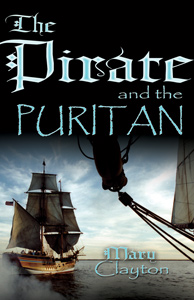
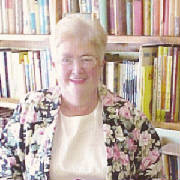
Monya Clayton interviewed by Maggie Bishop
1. Tell us about your latest published book and your current writing project.
Latest published book is sexy contemporary Blueprint For Love (as Monya Clayton),
in October last year as an e-book from The Wild Rose Press and e-selling sites. It's been available in print on Amazon and
the other online booksellers since January. It's very modern, has a strong heroine with a vulnerable heart. She's an environmentalist
who objects to the hero's latest project which will destroy a seafront palm-tree garden. He's quite yummy and they're attracted,
but being on opposite sides of the argument the sparks certainly fly between Cathy and Paul!
Current project, lol, is
editing my second contemporary, A Mismatched Pair. Next is to edit my second historical, Sister Portman's Pirate. Some way
down the track to publication for both of them yet! And all the other unfinished novels on the computer, the typewritten first
drafts, and the ideas in my head, are patiently waiting their turn. Oh, and there's also a short story, Lily's Captain, at www.thewildrosepress.com
2. You write both contemporary and historical fiction. What do you like best about each?
With contemporary one can't get much wrong, as in fashions, dialogue etc., because the world is all about
you. As for historical, I'm deeply interested in the past and how people lived.
3. What is the most difficult aspect of writing each?
With contemporary
I at first had a problem with sex scenes, but I feel they're natural to the times and should be included. I'm sixty-plus so
it's a generational thing. I think I'm getting better at it, but the scenes must be relevant to the story and to the relationship
and not included simply for titillation.
With historical it's the concern with getting things right, the research. For
The Pirate And The Puritan (as Mary Clayton) I knew the basic background but needed to learn much more. It was written before
I owned a computer so the research was conducted mainly in libraries. I'm Australian so couldn't do it personally. I wrote
to the U.S. for some information about Charleston (then Charles Town), South Carolina. It was extremely interesting to learn,
for one thing, that in 1704 the city was the only walled one in the Americas. I did make a couple of small mistakes, I discovered
later. I live in a warm climate and mentioned lemons once or twice, and of course they weren't common or procurable at that
time. One of the British-born members of our local Writers Group told me that until the 1950s England imported all its citrus
fruit from Spain, and I believe only limes were available from the West Indies in the 18th century. It's a tiny thing, and
no one else has noticed yet! It's a case of letting go of one's modern mindsets.
4. Tell us about the most fun you had at a book signing.
Oh dear, I haven't had a formal book-signing yet! It will happen, but there's the difficulty of importing print copies
from the U.S. So far I have signed copies in several local newsagents, and hopefully will gradually place them in bookstores
as well. This is a country area, I live in a small town (1200 people), and the nearest bigger towns are each about fifty kilmotres
away. (Thirty and thirty-five miles respectively.) And, like all modern businesses, the bookshops are stocked by their head
offices in Sydney. There are a couple that are franchises though, and I'm in the process of sounding out their willingness
to stock my work.
5. Which author/book had the most influence on your writing and why?
That's actually difficult to answer! Of course there are writers and books I love, but my own style is that of a storyteller
and not in their league. When I was a youngster I preferred boys' adventure yarns to girls' fiction, and that has carried
over into great admiration for C.S. Forester (the Hornblower series & other works like Brown On Resolution), Patrick O'Brian
(the Aubrey-Maturin series), and George MacDonald Fraser (the Flashman series). Mary Renault's historical fiction set in the
classic Greek world and the older Cretan civilisation, such as The King Must Die, are absolutely superb. Georgette Heyer is
in a class of her own with her 18th century and original Regencies such as Arabella and The Grand Sophy. What I admire most
about their work is their lucidity. Editors used to pull me up for being too wordy, but I'm definitely improving in that area.
As Hemingway once said, "If it reads easy, it was writ hard."
6. What writing habit are most proud of?
I am not organised and never have been, though I tend to write at night when my husband is asleep and I have
few distractions. I expect it's the fact I'm hanging in there and trying not to get discouraged by the whole competitive nature
of writing in these days when there are huge turnovers of romance books and thousands of authors. There's also the necessity
of self-promotion, which can be very time consuming but is absolutely necessary if one is to bring one's name to the attention
of the reading public.
7. Describe your writing space.
We built our home here, physically, ourselves, and moved inside in 2001. We included a room specifically for me to work
in and keep my books. A few thousand, if I bothered to count them. My desk is big and second-hand and never neat. I occasionally
tidy it up! The computer apparatus takes up half of it, and I have a plastic set of filing drawers beside it, and more stuff
(research, old ms. etc.) in the desk drawers. A little shelf set to one side holds the mechanical things and the dictionaries
etc. My favourite is the Reader's Digest Word Finder. It also holds my clear nail polish and a small mirror and set of eyebrow
tweezers for the times when I can't think of the next word! Oh, and one window, in front of the desk, has to be left open
for the cat to come in and out of. This gets a bit chilly in winter!
8. How did you meet your husband? (We love a romance.)
I can tell you how he first heard of me! We were both at high school in our home town of Ipswich, about 90 miles way. We
weren't in the same class but had some teachers in common. Since I always did well in English the English teacher was in the
habit of taking some of my essays around the other classes, and he said he resented it! I was pointed out to him one day,
he said, and since I was skinny and plain he was not terrifically interested. However, when we finished high school we ended
up working in the same place, a large joinery and cabinet-making workshop, he as an apprentice and I in the office. After
about two years he asked me out, and after going steady for a year and a half we sort of took it for granted we'd get married.
Our 50th anniversary is coming up in a few months. We're complete opposites, he immensely talented in practical matters like
cars and woodwork, and I a reader and writer, but we rub along well, Especially now we're oldish and very few things are worth
the effort of an argument!
Nothing really romantic, but then I found out later he'd fought every single other apprentice
in that joinery for the right to ask me out. He won, of course. He's still 6feet 41/2 inches tall and still, nearing seventy,
very strong. And determined!
9. How did your family get to Australia?
My mother's parents were both born here of immigrant parents in the 1890s. Her father's parents were German,
her mother's English. There is a romantic story in the family that my grandfather's dad was from a wealthy family of wine-makers
in Prussia and ran off to the other side of the world with one of the housemaids! Don't know how true it is but it sounds
good. My father's parents were of English and Irish extraction and I'm afraid I don't know anything of their predessors.
Their name was Conroy and it's always tempting to wonder if there was an Irish convict in my paternal granddad's
background. Having a convict ancestor in Australia is a cause for a weird type of reverse kudos. Many of course were transported
for what today would be trifling misdeamenours like stealing a loaf of bread. But some were real criminals!"
Monya,
my first name, sounds as if I have exotic ancestry like Russian or Aboriginal Australian, (the latter were here at least 50,000
years before the British arrived on their doorstep, complete with convicts, in 1788.) But my name has a simple explanation
- my mother saw it in a movie! Of course, it was unusual when I was young in the 1940s and 50s, when girls were called things
like Glenda, Janice and Dorothy. Mind you, I took a secret pride in the fact it was apparently unique. Right up to about two
years ago, when I googled it... The first page alone was hilarious
10. Tell us something about your corner of the world – we love travel.
Our small town in south-east Queensland is very quiet and pleasant and has all the necessary shops - grocer, chemist (drugstore),
post office, hairdresser, doctor, etc. It is in a farming area, grows wheat, peanuts, corn and sunflowers. The largest industry
is the piggeries. It's on the Darling Downs (I know that looks odd but it was named for a governor of New South Wales of that
surname). We do our main grocery shop in Warwick, small city of 10,000 with more amenities. Larger town, Toowoomba, has a
population of 90,000 and even more amenities, like specialist doctors, hospitals, large shopping centres. It's called The
Garden City and hosts Australia's oldest yearly garden festival, the Carnival of Flowers. It's quite lovely, but I remember
it as a big country town when I was a child and find it's getting some unpleasant city edges!
11. Chat about your pets – we love those, too.
One dog, one cat. Dog is Woofer for reasons plain to everyone who walks past. It comes in handy for my husband, who has
hearing aids and knows when Woofer barks in a certain tone someone has come in the gate. We acquired him at age 2 from a neighbour
who moved away and he'll be 11 years old in June. Still pretty healthy. He's what we call a 'bitzer' or 'mongrel' in Oz, half
Blue Heeler (cattle dog) and half German Shepherd (Alsatian). He's never bitten anyone in his life but I couldn't swear he
wouldn't if either of us was threatened. He loves the grandchildren, any children really, and even the cat (when we're not
looking).
Cat's name is Smokey, a grey tabby, he'll be 3 years old in August. We found him as a kitten in our carport,
in the empty engine bay of our car when my husband was working on it. As far as we can work out, his mother was a stray and
put him there for safety. He certainly landed on his feet. Because my husband found him he's Arthur's cat and jumps on Arthur's
lap for cuddles. But he's becoming much nicer to me since he worked out I'm the one who feeds him. Well fed too, he's a big
boy! He's given up chasing birds and he doesn't DO trees, but he's a great mouser and presently having the time of his life
since it's autumn (fall) here, coming on winter, and winter is mouse season. (Farm country, plenty of them). I just wish he
wouldn't leave the bodies in the bathroom...
12. What is your favorite southern Australian food? (We like to ask a "southern" question since we live in the
American South.)
Actually, we don't have much food change from coast to coast or north and south, and not much in the line
of regional differences except city and country. (Sydney and Melbourne alone are home to a third of the population.) Being
in the southern hemisphere, we in the northern part of the country are in the warm area. If there's a common Australian preference
it's for seafood, though that's around the (considerable, since we're an island continent) coastline. Inland they go more
for steak, eggs and potatoes and similar uncomplicated tucker (food). We're fortunate to have climate zones much like the
U.S., stretching from cold temperate Tasmania in the south to the tropics of Queensland, Western Australia and the Northern
Territory in the north, so just about anything can be grown and is.
We ate fairly plainly until the 1950s, until Greek,
Italian and other immigrants introduced us to new cuisines. And we ate and cooked mostly at home until the 1980s, when the
restaurant and cafe culture caught on. Of course, the larger the city the more eat-out places it possesses. As for take-out,
that was pretty much meat pies and fish and chips until the 1970s when KFC and MacDonalds started up. In our little town we
even have two choices of eat-in and, including the shop, three of takeaway. But it's still cheaper to cook. And thank goodness
for the freezer .
http://historicalfictionbooks.ning.com/profile/MonyaClayton
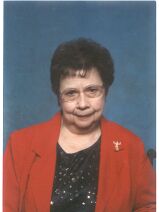
Beverly Scott interviewed by Maggie Bishop
1. Tell us about your latest published book and your current writing project.
Jena’s Choice was the last book I had published and I Paid to have it done.
In the process, I retained all rights and the publisher created a great cover, used larger print and set the price at a fair
amount. I also received 50 copies of the book; selling them covered my cost. Although Jena’s Choice published last, it was my first. Because of that, it received a greater number of rewrites. Many of my readers consider
it my best. I just finished my fourth novel and I am searching for an agent. I am hoping the controversial title will attract
an agent and a traditional publisher. The title: "WHITE NIGGER" is a contemporary novel dealing with racism. River Rose’s
mother disappears while River and her half sister and brother are in the care of Ivan Severs, a black man. When one of her
mother’s men friends accosts River, Ivan retaliates then packs them up and they leave Oklahoma. They settle in small-town
Iowa where the school bully taunts River. The taunt "White Nigger" follows River in school and out. (The taunt ‘white
nigger’ was used here in Iowa.)
2. What started you writing historicals? I have been researching Native Americans
for years. That research lead to Jena’s Choice. History was my favorite subject in
school and I have always enjoyed reading a Historical.
3. Where did the idea to use a doll at books signings come from? In the process
of a rewrite, I was intrigued by fashion in1869 and that led to creating a doll to display the image of Jena and clothing
style of that time. Most of all I needed an attention getter for a book signing, it worked.
4. How do you overcome or avoid "writer’s block"? If I am blocked on a story
line I imagine I am in a beautiful spot and I use words to draw a picture of what surrounds me or I spend a few hours doing
a jigsaw puzzle. Both are relaxing and usually that is all it takes. If the problem persists and a rewrite does not help,
I pick up a good book and leave it for a time. The problem with those puzzles: they are addicting.
5. How/why did you start writing reviews? What better way to get your name out
to the public. Writing reviews is also a great way to hone your writing skills and, now and then, it entices someone to read
my novels. Those reviews have led to friendships. I have made many computer friends that way and in the process met some great
still-unknown authors.
6. What tips do you have about writing reviews? First, read the book. Don’t
give away the plot but do tell readers enough to grab their interest. Mention the author’s other material and if you
enjoyed the book, say so.
7. What is your writing day like? We are still involved with our own business,
and I am helping to put on the 41st International Edsel Club Rally in Omaha, NE. I recently signed a contract with
an agent but between the phone, creating raffles and keeping RA at bay, I have started book 5. When I can’t be at the
computer, I keep busy building on the story line in my head.
8. Who influenced you the most in your writing career? The person that made the
comment in the pages of the ‘Writers Digest’ to stop reading about writing and sit down and write, prompted me,
made me get serious about writing a book. It also helps that I have my families support. Without my loving husband taking
over so many of the household chores, it would be difficult to find writing time. All the great writers that I have been reading
for years helped also.
9. Tell us about your 50 Edsels. We have Edsel strung all over central Iowa; started
out with one and they just seemed to multiply. Edsel have that in common with rabbits. My husband does not trust banks or
the stock market so we invested in Edsels. (Edsels have not been bothered by this economic down turn) Because of our Edsels;
we have traveled, made friends across the country and through it all we have had a lot of fun.
10. Tell us something about your part of the country – we love travel. Iowa
is a warm friendly state beautifully green in summer & spring, abundantly colorful in the fall and blanketed with cold
white snow in the winter. Iowa is home to flat plains perfect for growing crops, gently rolling hills graced with crops or
filled with grazing livestock, and to beautiful scenic high cliffs and deep valley’s. Visitors are never disappointed
with time spent here and many travel back to Iowa each year to enjoy our marvelous state fair.
11. Chat about your pets – we love those, too. There are no pets. It keeps
Scotty busy just taking care of me. Forty years of RA has left me with constant challenges. Over the years’ my mobility
has diminished along with a bunch of ordinary, day-to-day skills. Besides Scotty doing all of that, he works to keep my mind
off the pain.
12. What is your favorite southern setting in a book Wow, I can’t imagine
a more perfect setting than that white-pillared multi-roomed southern mansion or a deep cave hidden among the rugged peaks
and valleys of a ridge of mountains. I always thought those Cliffside dwellings would make a great setting for a murder mystery.
My advice to writers is "If you dream of writing, stop dreaming and start writing. Face each day with a spirit
of adventure: even negative experiences can bring positive results. If you are bored – read a book. If you are lonely
– read a book. If you are depressed – read a book. Remember, what ever problem you face, make a book your drug
of choice."
http://www.beverlyjscott.com
http://www.authorsden.com/beverlyjscott
http://bookadz.com/
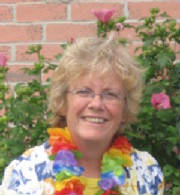
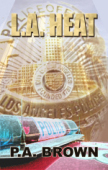
Pat Brown, Author, interviewed by Maggie Bishop
1. Tell us about your latest published book and your current writing project.
L.A. Heat is being reissued this month. This is a revised edition with some
significant changes which I think make a stronger story. Following that soon will be L.A. Boneyard, the first
full length Chris and David novel after L.A. Heat. My current working project is a novel I'm calling The
Forest of Corpses, which is the second in a new series about a Santa Barbara homicide detective and his unexpected
love affair with Jason Zachary. This series is quite a departure for me, since it involves the BDSM world where Alexander
Spider, the cop is a dom and Jason is his too eager submissive. The first book in that series is titled The Geography
of Murder
2. How did Detective David Laine
of L. A. Heat first come to you?
David came to me through my love of author Jonathan Kellerman's Milo Sturgis.
I loved reading about Milo and it got me thinking about the whole world of gay cops and what they face in their work lives.
I wanted to write a mystery set in Los Angeles, since I lived there for 8 years and knew the milieu was ripe with story ideas.
The thing that had always struck me about Hollywood in general and the gay community in particular was the love affair they
have with image. The way people worship beauty. And I wanted to play with that. What if there was a man who didn't fit that
mold who through circumstances was thrown together with one of those 'beautiful' people and they fell in love? Could it work?
What would the dynamics be like? I wanted to explore that, and throw the added dynamic of one of them – Chris, the beautiful
one – having money as well. David grew up with money (that's another story) but as a cop lives modestly, so there's
a constant clash when Chris wants to spend money on him and he can't reciprocate.
3. In the L. A. series, you write about a
dark world. How do you keep from being depressed in your non-writing life?
My books may be dark, and some of my characters downright nasty, but I think
my protagonists are all essentially good people, even when they're on the wrong side of the law or walk on the edge of it
like the cop Spider in The Geography of Murder does. And for the most part
my stories all have happy endings, even if the happiness is relative and may very well not last. I guess I'm the type who
always sees the light at the end of the tunnel and doesn't see an oncoming train. I think part of it comes from being very
ill a couple of years ago, to the point where I've been told I almost died. It gives you a very different perspective on life
to know you almost lost it, especially just as you were achieving your goal. As it turned out my best books hadn't been written
yet.
4. You also write erotica. What fun! What
is the most difficult aspect of writing in that genre?
I'd say the most difficult thing is, because I write about gay men sexually
is getting it right. I don't want to write a female fantasy, though I'm well aware that a lot of the readers of gay male erotica
are women, I still write in my head for the men. Nothing pleases me more than hearing from readers who thinks I succeeded.
I don't mind providing a one-handed read!
5. Describe a typical writing day for you.
I wake up early. Sometimes as early as 4 or 5 am. I rarely get to bed before
1 am. (I suffer a lot of insomnia, especially when a book is going well) Even on days the writing isn't going well I still
spend several hours in front of my laptop. I recently wrote an entire 72,000 word book (The Geography of Murder) in 3 weeks, the entire thing being critiqued as I wrote, basically revised on the run. I don't think
I slept more than 3 or 4 hours a night during that binge. I think it turned out very well. There was extensive rewriting on
it, of course, but all my books are as much rewritten as written.
6. Authors must promote. What has been your
most unique promotion?
One day I was in the Toronto airport making a flight to the US. When I passed
through the US customs portal the guy who checked over my passport asked what I was traveling for. I told him I was heading
for a mystery writer's conference. He was so intrigued he actually looked me up online right there, knew my name, the name
of my book, even that it was a gay mystery. He actually told me he'd have to pick up a copy. I offered him one, but of course
he couldn't take gifts. I would love to know if he actually does read the book and what he thought of it. Who knows, maybe
in the future I'll get an email from a US custom's officer. Wouldn't that be a trip?
7. What is your most cherished reader reaction
to your work?
That they not only read and love my books, but that they will reread them. Actually,
just getting an email from a reader saying they like my work is exciting and gratifying.
8. Who or what organization has been the biggest
influence in your writing career and why?
I don't think it was a person or organization so much as coming within inches
of dying 2 years ago. I was literally on death's door and frankly there's a period of about 4 months which I have almost no
memory of, which from what I've been told, is probably a good thing. But it gave me a stark awareness of my mortality and
the fact that if I want to do something I need to do it now, not in some future place. So I have taken my writing far more
seriously and devote almost all my time to it. It's paid off too. I have at least 8 books and novellas under contract to MLR
Press, and another 3 published or going to be published by Bristlecone Pine Press. It took me 40 years to get L.A. Heat
published in 2006. Over that time period I wrote something like 7 books, all of
them science fiction except one romance novel. None of them sold, but all proved to me I was a writer. I never thought I'd
write mysteries – I was convinced I couldn't write intricate plots. But I tried it anyway. Now I have something like
a dozen mysteries, plus a handful of published erotica stories. I don't know if I would have been this productive if I had
stayed healthy and employed full time. I'll never know, I guess.
9. What part of the craft of writing has improved
since your first book?
I think my plotting has improved. I find my books are growing deeper and more
complex in many ways. I don't believe in writing books that are thinly disguised messages, but I also like to give my books
a social conscience, mostly in the form of positive gay characters who are just like anyone else, except they are gay.
10. Tell us something about your part of the
country – we love travel.
My area of Ontario has a lot of nice small towns, with some beautiful old homes. Stratford,
where I lived for a year, is a wonderful little town full of artists and theater people. There's a lot of natural beauty here
too. The Niagara Escarpment is stunning, especially in the fall. I'm no fan of winter, but a big snowstorm can produce some
spectacular vistas – as long as I can see them from inside, in front of a big fire place. Of course I love Toronto,
a vibrant, multi-cultural city I visit whenever I can. Fortunately I have family there, so visiting is easy. Ottawa is another
city I highly recommend.
11. Chat about your pets – we love those, too.
Sadly my health has forced me to give up my pets, so right now I have none. I don't know if
I'll ever get well enough to care for a dog again, and dogs are my favorite. Especially big dogs.
12. What is your favorite southern travel spot?
I'd have to say Hawaii. I lived there 22 years ago and never stopped missing it. Recently
I attended the Left Coast Crime on the Big Island and it was great to be back. Right now my aim is to get to L.A. next year
for the LCC 2010, because L. A. remains one of my first loves.
http://www.pabrown.ca/
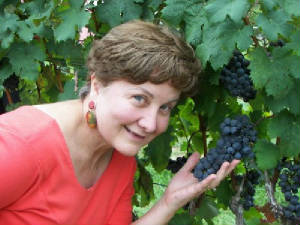
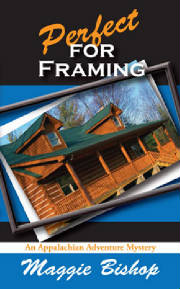
Maggie Bishop Answers the Dames Dozen
1.Tell us about your writing.
I started with romance and have turned to murder in my Appalachian Adventure series. Shortly after moving to the North
Carolina mountains, I realized that simply living with this topography was like getting to know a challenging character so
I write cozies in which the setting is almost a character. In Murder at Blue Falls, a CSI wannabe leads trail
rides. When her horse finds a body, Jemma starts to investigate, Detective Tucker enters and the mystery twists and turns
from there. In the sequel, Perfect for Framing, there’s trouble a-brewing at a Property Owners Association
and Jemma is once again involved with a mystery. Emeralds in the Snow involves downhill skiing, a treasure hunt
and a cold case mystery. Appalachian Paradise is pure romance on a five-day backpacking trek. And there’s
my cat book, Meow Means Me! Now!, dictated by my feline in rhyme which takes him from being a kitten to an old
guy.
2.Are you a member of any writers’ critique groups? If so, do you think it has benefitted you?
I’m a member of High Country Writers, a group in Boone, NC, that I founded in 1995. We have a critique session
on the second meeting of the month. By critiquing other manuscripts, I pass forward the help I received when I started out.
At this point, I rely on my Editor to critique my work
3. Tell us about the workshops you’ve put together. Currently I have designed four workshops to help other writers.
On Stage! Book Signings gives the steps needed to set up, attend and follow up book signings. Five Keys to
Writing a Mystery, Internet Connections and Begin to Write that Novel/Memoir are designed for a one-hour format.
They are all interactive and have handouts.
4. You have written five books. What have you learned about writing that you wish you had known when you started? Has it
gotten any easier? Study the craft and try the tips to improve your writing. I just returned from a Break Into Fiction
retreat, a workshop on character driven plotting, given by Mary Buckham and Dianna Love and now know that plotting
can be easier. Also, don’t talk about your story before and during the first draft. Parts of the soul of the tale leak
out when you do that. Your energy for the discovery dissipates. Hold onto that precious part of creating.
5. You write mystery and romance. What do you think the two genres have in common? Both plot lines evolve out of the
character’s growth. We feel better when someone becomes a better human being and we, as readers, can feel the change
in the character as they learn something about themselves. I write commercial fiction and expect a positive outcome at the
end of the story.
6. How did you come up with your Appalachian Adventure series? Experiencing the outdoors by hiking, skiing and horse
back riding takes me back to an appreciation of nature and I want to pass on that feeling to readers. I decided to have four
male cousins run into adventure, romance and mystery in the mountains. Since I was a ski patroller, I was able to use first-hand
background information in Emeralds in the Snow to give authenticity to the novel.
7. What do you think sets this series apart from other mystery series? The setting, the characters and the mysteries
are unique to the mountains. I’ve put a fictional dude ranch near Boone, NC, because I think we need one. Jemma Chase’s
love of CSI doesn’t interfere with her three jobs – trail-ride leader, carpenter and photographer. In today’s
economy and in the service orientated jobs in a tourist area, she resembles the local people. However, she is from off the
mountain originally and continues to learn the ways of the proud and crafty Appalachian people.
8. Are you a pantser or outliner? Until recently, I claimed to be a panster, wanting to discover the story as I wrote.
The one time I plotted ahead, the story lay on the page. I ended up destroying all evidence of that story. However, now I
view the panster-outliner as a continuum and I’m a 3 on a scale of 1 to 10 (panster being number one, of course).
9. Do you have any particular writing rituals? The house has to be quiet and I sit on the couch and write the first
draft longhand in ink on a tablet. I stop by four and have a glass of champagne.
10. What advice would you offer other writers? Read and write. Ask yourself, if your writing world were perfect, when
would you write? How many days a week? Then arrange your schedule to be as close to that as possible and write. Log the hours
written onto a calendar in a prominent place. After two months of writing those four or five days a week, give yourself an
award. A massage would be good. When writing the first draft, turn off the internal editor. Give yourself permission not to
judge.
11. Why did you start writing? One year when my husband and I headed off to a vacation on a dude ranch, someone in
the office gave me a contemporary romance to read. That year, I read four hundred books and held down a demanding full time
job. I read at traffic lights, during lunch, first thing in the morning and last moments at night. One morning I said "I can
do this" and joined Romance Writers of America, took their craft courses and have written ever since.
12. What’s your favorite Southern phrase? Ball hootin’ – that’s when you’re driving down
a mountain road with black ice, the back end of the truck starts weaving and you go ball hootin’ down, almost out of
control.
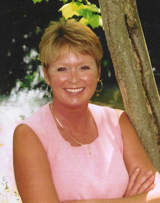
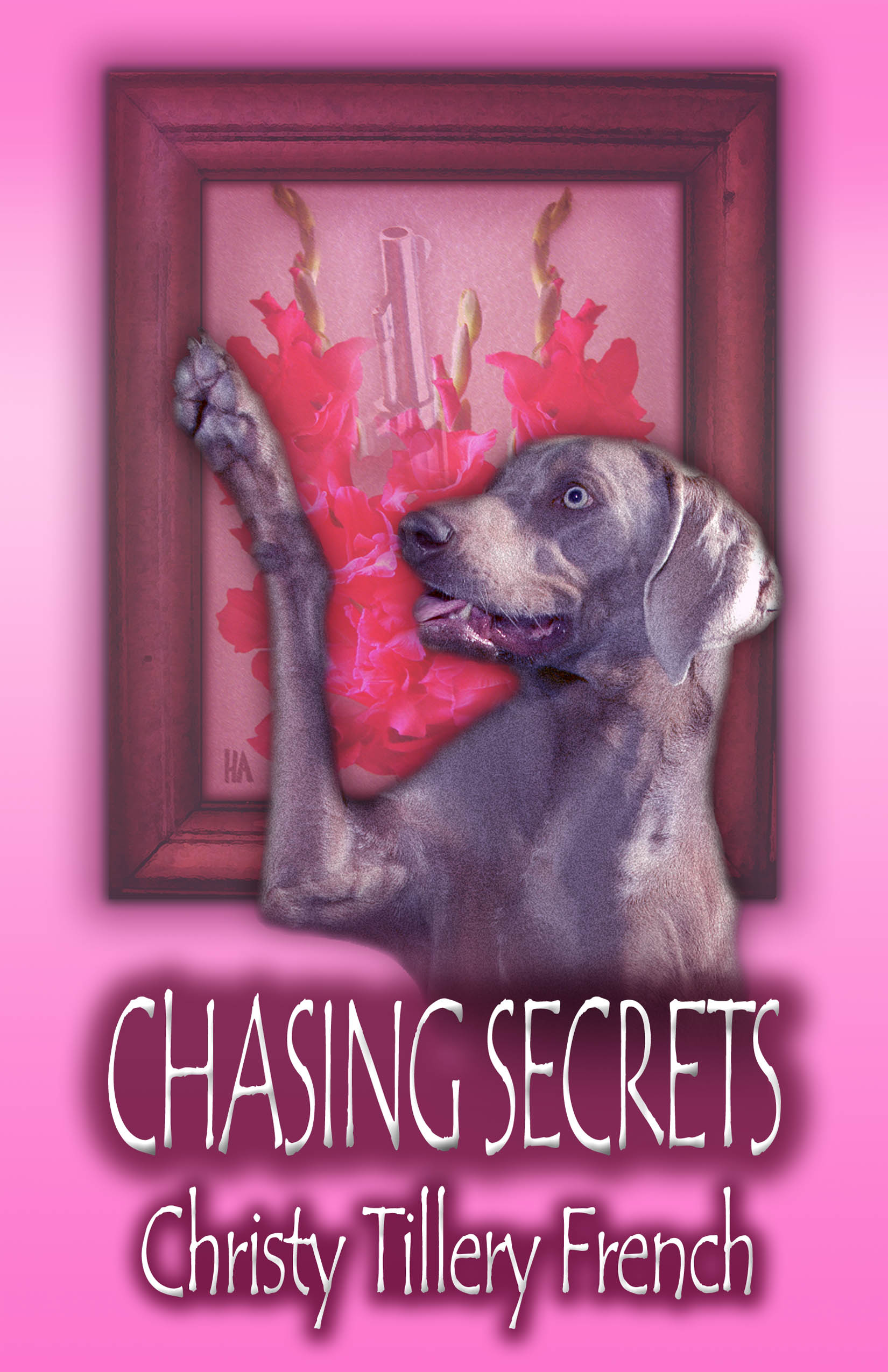
Christy Tillery French answers the Dames Dozen
1. Give us your "elevator" speech about
your latest book, Chasing Secrets.
An ATF agent on the run from a corrupt TV evangelist, crime boss and her own agency. The only
thing she can count on: her dog Zeus and just maybe Detective Garrett Somersby.
2. What brought you to Tennessee?
I was born here and have lived in East Tennessee all my life except for a short stent in LA,
where my husband is from. I couldn’t get used to the flat land and brown air and people on top of people. I missed the
mountains and lakes so much, I had to come back.
3. How did Natasha of your Bodyguard series come to you?
I was driving home from a book fair, trying to think of a protagonist for a series, and the
idea popped into my head. With a bodyguard character, I have at my disposal a multitude of clients she can protect leading
to a plethora of situations she can get into. I wanted her to be Southern, young (so she can mature as the series does) and
kick-butt. Hence, Natasha Chamberlain was born.
4. Tell us what you have in store for Natasha (last time she protected a rock
star).
My next book, which is slated for publication this year, she’s guarding a slimy defense
attorney who’s been targeted by the head of a criminal organization.
5. Do you outline and plot ahead? Why/why not?
I’m what is considered a “pantser”. I never outline or plot ahead. I start
writing and let the characters take the story wherever it’s going to go because it’s so much more interesting
that way and I’ve learned it works better for me. If I have a mental wrestling match with my protag, trying to go one
way when she wants to go the other, she always wins and the only thing I’ve accomplished is loss of time and a flare-up
of carpal tunnel. I never write sequentially and many times write the last chapter first and then jump around. My final steps
are putting the chapters in order and doing a chapter-by-chapter outline to make sure I have the time frames, scenes, etc.
where they need to be and that everything flows. I’ve tried to write chronologically, but every time I do, a wall goes
up. I guess I’m not a linear thinker.
6. What keeps you from giving up writing?
Um, pure idiocy? Kidding. It’s simply the fact that I can’t not write. When an idea
starts banging around in my head, the pressure builds until I have to write it or go nuts. This field is so competitive and
so tilted toward not being successful, it’s almost impossible not to get discouraged. If I didn’t love writing
so much, I’m sure I would have given up a long time ago.
7. You donate proceeds from the sales of your books to a Weimaraner rescue group and
offer your books at rescue fund raisers. How did you become involved in Weimaraner rescue? What do you love about this particular
breed?
I joined Wolf Creek Weimaraner Rescue as
a volunteer shortly after its inception because they are so committed to saving these special dogs. We’ve seen some
tragic cases but it’s a beautiful thing to watch a Weim blossom under Wolf Creek’s care and subsequently be placed
in a forever home. Weimaraners rate high in regards to abandonment or neglect, simply because people don’t research
them before they purchase them. These are high-energy dogs that require much quality time with their families. The thought
of these beautiful dogs – well, any animal – being mistreated or ending up in a kill shelter not only horrifies
me but makes me very angry. I became a true dog lover when my husband gave me a Weimaraner pup for my birthday several years
ago. I fell for this breed and fell hard. Weims are called Velcro dogs because they attach themselves to their families and
are not happy unless they are interacting with that family. They’re affectionate, loyal, protective, and intelligent
but very manipulative. We’ve since rescued five other dogs: two more Weims, two black Labs, and an Australian Blue Heeler.
I encourage anyone considering adding a pet to their family to think about adopting or rescuing. Help save a life, please.
8. Who is the most interesting
person you’ve met at a book signing or event?
I met the original Marlboro Man, William
Thourlby, at a book festival and he is still gorgeous! By the way, he told me he was never a smoker. He writes self-help books,
and when he found out I write humorous fiction, he encouraged me to continue on that path. He’s a wonderful storyteller,
and I enjoyed spending time with him.
9. Tell us about your favorite southern food.
Oh, shoot, that’s hard. Banana pudding. No, maybe it’s peach cobbler..
10. Where's the spot in your home or nearby you run to when you want a moment
alone?
My office. The door locks.
11. How did you meet your husband? (We love a romance!)
Okay, this is going to sound weird, but it’s not illegal. Honest! My husband is my stepmother’s
nephew, so let me clarify, this is our only familial relationship and we are not related by blood. Steve came to Tennessee
from California to visit his aunt (my stepmother), we met, and that was it for me. I was the quintessential goody two-shoes,
raised by Southern Baptist parents, and he was the complete opposite, a real wild guy. He sported long hair, tattoos, rode
a motorcycle, and smoked more than cigarettes if you get my gist. Needless to say, my mom and dad just about died when I started
dating him. Now he’s morphed into a good ole Southern boy and both my parents adore him. Go figure.
12. What advice do you have for new writers?
Persevere. Never give up. Keep pushing forward, keep learning the craft, keep writing, but most
of all, enjoy the journey and have fun.

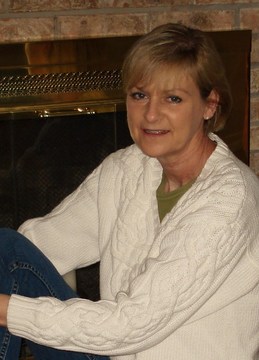
1. Give us your "elevator speech" about your latest novel, Snow Shadows.
Oh, lord, this is always so hard for me, but here goes...Average, ordinary Betty Sue Corn goes to Eternity Mountain after
being suspended from her job. While there, she meets Marcus Tassel, a man who's anything but ordinary. She's smitten, but
Marc does his best to resist her advances. He's a shape shifter with psychic powers and he's been having visions about her
for a long time, visions that always end with his death. Betty Sue isn't willing to let him get away just because of a dream
that may or may not come true. She wants her happily-ever-after and she's willing to do whatever it takes to get it, even
risk her own life.
2. How did you end up in the North Carolina mountains?
I’m originally from East Tennessee but spent quite a bit time in the North Carolina mountains as a child because
my dad’s family is from this area. In 1999, my husband and I moved from Knoxville to Maine where we lived for almost
8 years. When we decided to move back to the South to be closer to our families, we settled on western North Carolina because
I always loved it here and as a child, that’s where I wanted to live. So he concentrated his job search in the Asheville
area and we moved into an apartment in Arden while we looked for a house. Asheville, like Knoxville, was a little too "big
city" for us and my dad suggested we look in Hendersonville. We did and ended up finding the perfect house for us.
3. Tell us about your experience with e-books.
When I finished my first "grown-up" novel, a sensual romantic suspense, I sent it to my sister who read it and urged me
to submit it. Being something of an introvert, I resisted until she suggested I try some of the e-publishers that were popping
up on the Internet back then. I submitted Unwilling Angels to five e-publishers and got offers from two of them,
the first from a company just starting up and the other from the prime of the e-publishing world at the time. I decided to
go with the new one, StarDust Press, thinking I could grow with them. Unfortunately, they didn’t make it and closed
their doors less than a year after my book came out. They were, luckily for me, very professional about the closing, letting
the authors know as soon as they could and sending out rights reversion letters for each of the works they’d contracted
for—I had signed another contract with them for my first paranormal romance shortly after my romantic suspense was released.
During that time, I had also entered a novella in a writing contest with another new e-publisher. I won the contest but
by the time my book was released, it was obvious there were problems and it was obvious the publisher wasn’t going to
make. Unlike my first publisher, this one wasn’t very professional about closing their doors. It took a while, but I
did finally get my rights to the book back and once I had that, I submitted it to another e-publisher. It was accepted and
re-released this past December.
So, I’ve had my share of successes with e-publishers and a few failures too. If someone asked, I would still recommend
going with e-publishing if, and this is a huge if, the author carefully researches them first and looks for the red flags
that usually indicate problems. Read everything you can find about the publisher and the owner(s), email a few of their authors
to ask how they feel about the publisher, and most important, pay attention to all the author warning sites and blogs out
there.
4. When's your best writing time of day and year and why?
I don’t have a best time of year, but the time of day that works best for me is late morning to early afternoon,
after I’ve been sufficiently caffeinated for the day. Oh, and it helps if the sun’s shining too—rainy days
bring out my lazy side.
5. How did you get started writing?
I’ve always wanted to write but never was quite serious enough about it to sit down and write an actual book. When
I finally did get serious, I wrote mainly poetry and books for younger audiences, but I never thought any of them were good
enough to actually get published so I just left them on my computer and played around with them every once in a while. Then
in 2005, I was diagnosed with Multiple Sclerosis and that was the kick in the pants I needed to finally make me take writing
seriously. Well, that and my sister, Christy, who was my lifeline during that time. Like most people who are diagnosed with
MS, I went through a period of depression and Christy told me to sit down and write about what I was feeling. I wrote a lot
of poetry during that time and then one day while I was waiting to see my neurologist I found a quote from Anais Nin in a
magazine, "I believe one writes because one has to create a world in which one can live." So, long story short—I know,
I know, too late for that!—I sat down at the computer and took Christy’s and Ms. Nin’s advice, I wrote about
a character who was dissatisfied with her life and I created a world in which she and I both could live. I ended up with my
first romantic suspense novel, a slew of not-very-good poems, and thanks to my dad, who sent me a book about Cherokee history,
an idea for my first paranormal romance series. And if you’ll pardon the cliché, the rest is history.
6. What's your favorite southern word or phrase?
I actually wrote a blog entry about this a while back while I was doing research on southern sayings because my sister
and I are writing a book about our great-aunt’s life growing up here in the North Carolina mountains. I have a lot of
favorites, but the one I like the best is, "That girl’s just naturally horizontal."
7. Of the minor characters you've created, who's your favorite and why?
Oooh, tough question! It changes with each book, so right now I’d have to go with Candice Corn, the sister of the
heroine in Storm Shadows, the book I just finished. Candice is the direct opposite of the heroine, Betty Sue,
and is, as my favorite southern saying goes, naturally horizontal. I’m having a lot of fun with the differences in the
two sisters and Candice, needless to say, causes problems for Betty Sue in the book, but she does the right thing in the end.
8. Other than writing, what do you enjoy doing?
I love to garden and am so happy that my husband and I finally found a house with a big backyard so I can have a vegetable
garden and multiple flower gardens this year. I like to can the vegetables I grow and make jams and jellies when the local
fruits come into season. I’m really looking forward to apple season this year! I knit, crochet, do counted cross-stitch,
and have even tried my hand at quilting. And of course, being a writer, I love to read; mostly fiction, but recently I’ve
found myself doing a lot of non-fiction reading for research, and surprisingly enough, I’m enjoying it. Other than that,
I’m an avid baseball fan and boy, do I miss living in Maine during the season. There always seemed to be a Red Sox game
on NESN, and since the Red Sox are my team of choice, I loved being able to watch their games.
9. Does music play a part in your life? If you were Karaoke Queen, what song would you sing?
Oh, definitely, music is a big part of my life…except when I’m writing. If there’s music playing while
I’m writing, I find myself getting lost in the song, singing along, or sometimes even typing the words to whatever’s
playing at the time. If I were Karaoke Queen—and believe me no one wants that to happen because I’m the worst
singer ever!—the song I would choose to sing would change depending on the day because my favorite song changes from
day to day, as does my favorite artist. But I have to say, it would probably be something by John Mellencamp or maybe Bob
Seger. Then again, I could go with Tom Petty and the Heartbreakers or Van Morrison or early Elton John. Anything, as long
as it’s not country!
10. If you could travel anywhere, where would you go and why?
I’m a homebody so I’m not much into traveling, but I’ve always wanted to go to Ireland…or maybe
Italy…or maybe Alaska…or maybe I could just stay right here at home and read a book about those places.
11. Is there anything you struggle with when you’re writing?
Head-hopping, I have a really bad tendency to switch POVs numerous times in one scene. That’s a big no-no for authors—or
it is for newer authors. I’ve seen some of the better known authors do it and get away with it, but if you’re
just starting out, like I am, you have to mind your p’s and q’s. Plus, the authors who do that successfully are
much more skilled than I am. Hopefully, I’ll reach that point one day and be able to seamlessly switch POVs within a
scene without jerking the reader out of the story.
12. What is the hardest part of writing your books?
I don’t know why, but I always hit a slump when I get to the middle of the story. The beginning usually flows really
fast for me then at the mid-point, it slows down. Once I work my way through the middle, everything picks up and starts to
flow again. Wish I could figure out why that happens so I could fix it!
http://www.freewebs.com/caitlynhunter/
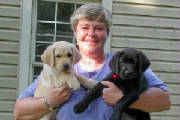
Nancy Kaiser, interviewed by
Maggie Bishop, February 2009
Give us your "elevator" speech about your recently released book.
Letting Go: An Ordinary Woman’s Extraordinary Journey of Healing & Transformation . Honestly, I don’t
have one. I guess I’d tell someone that it’s the story of how I survived being left by my husband of 27 years
six hundred miles from everyone I knew without a home or job. It follows my journey from being completely clueless to becoming
fully aware of my creation and all the steps in between.
What brought you to the Boone, NC, area? Without
doubt, it was destiny. The actual vehicle was a timeshare exchange. We wanted to go to the Adirondacks, but nothing
was available. We were offered a week in Boone. I thought to myself, "Well, at least it’s out of New Jersey." As they
say, the rest is history, or as I believe, destiny.
Where is your favorite spot in the South? The natural
beauty of the area stole my heart. I was drawn to the phenomenal energy of Grandfather Mountain. We decided we could live
happily here and came back over the next few years trying to find our spot. No matter where we stayed from Asheville northward,
we’d always end up back near Grandfather and Boone. Then, we’d have to drive all the way back to our timeshare
at the end of the day. A dozen years later, the timing was right. We sold our farm and moved in May 04.
What inspired this book? My inspiration
to write was about survival. I wrote in order to understand the events that occurred after we moved from our farm in central
New Jersey to our dream property on Three Top Mountain in Creston. Six weeks into construction of our dream house, my husband
told me he never wanted any of this. I was dumbstruck and clueless. My glorious dream morphed into my worst nightmare with
his words. My answer is really two-fold: I wrote to understand and heal myself. I published the book for others. If I help
even one person recognize their life lessons more quickly, thereby shortening their own traumatic journey, then it’s
been worth the time and expense of publishing.
How long did it take to write and what are your writing habits? It took 14 months to write, but I was still living through my experiences, so that’s a consideration.
I began very sporadically with several weeks in between sessions. Given my reason for writing, I wrote when inspired. I wrote
from my heart expressing the pain and confusion I was feeling. The more I wrote, the more I recognized that writing was critical
to my surviving the most difficult time in my life. Eventually, I became almost obsessed with it. I’d sit at the computer
pouring out all my soul needed me to feel, see, learn, and let go of. Before I knew it the day would be over, and the next,
and the next. I had an interesting experience near the end of my writing. I’d been very sick and hadn’t written
for over a month. I was feeling guilty, so I wrote for about an hour one afternoon. For the first time ever, my writing disappeared
into cyberspace for no apparent reason. I was so aggravated. Having learned the hard way that everything happens for a reason,
I analyze everything. Very quickly, I recognized that what I’d written had been forced. I’d written from my mind
out of a sense of obligation. It hadn’t come from my heart. The words held no feeling or meaning. It was trash and ended
up just where it should have. I never wrote again from a self-imposed sense of duty. I always wrote, and write, from my heart.
It was a valuable lesson that only cost me an hour or so of my time; a very small price for such a powerful teaching.
What was the most difficult aspect of writing
this book? First and foremost, living through the
experiences that brought me so much pain, confusion, self-doubt and heartache was the most difficult. Writing was a method
of expression that allowed me to learn, let go and heal. Second, the decision to publish presented an emotional challenge.
I was given so much encouragement by friends who’d read some of my writing. They saw the power of my words for others
and convinced me to go to the next level. To them, I will be forever in debt. To write for your eyes only is one thing. To
put your writing out there for the world to read is a totally different thing, especially when it contains your innermost
feelings and confessions. For me, the decision to publish was a sign that my self-confidence was on the rise, while my self-doubt
was ebbing. Lastly, the job of editing became an enormous task. It took 19 months to gently cut it down from 299,000-plus
words to 180,000. Initially, I couldn’t accept the opinion that it had to be half its size. I’d say, "There’ll
be nothing left." It took so long because of me. Because of the nature of the story, I couldn’t hand it over to someone
to edit without me. I had to cut carefully. I was the only one who knew which of the mundane events was crucial to my recovery.
I had reduced it considerably before my editor got involved. I was led to an incredibly patient and gifted editor. We went
through the entire manuscript two or three more times condensing and tweaking. It was tedious, tiring and frustrating, but
oh, so necessary. I learned that writing is therapeutic, but publishing is business and must be regarded as such.
What was the most fun or memorable?
Well, there wasn’t anything I could categorize as fun,
but memorable for sure. Every time I’d get hit with an "ah ha, moment" was very profound. I’d discover a powerful
lesson, a piece to the puzzle of my life, which I’d never even glimpsed at while experiencing it. These were the precious
gems that rewarded me for all the honesty and effort I put into my writing. They were the reasons why I wrote: to understand,
to learn, to grow, to let go, to heal. Writing gave all of these to me.
Do you have any advice for someone considering
writing a book? Write for the "right" reasons for
you. Write from your heart. Publish to contribute something of value to others not just to earn money. Surround yourself with
professionals that respect your opinion regardless of your inexperience. Be open to constructive criticism and be willing
to explore new possibilities and options. Remain true to your purpose and know that your heart knows best. Even if you never
publish, the act of writing alone may be all you need. Writing healed me; publishing didn’t. But, know that the first
time you hold your own book is magical and enormously satisfying. Each time you hear how your words have helped another, your
heart warms and you smile. Those are the moments you’ll remember long after any money you’ve earned is spent.
What do you do when you aren't writing? My
lifelong joy & passion is riding horses. So, I’m usually in Blowing Rock training my dear horse Stormy. The rest
of my time is spent working with others’ animals. I operate "Just Ask" Communications from my home in Todd. I specialize
in animal communication, Spiritual Response Therapy, vibrational remedies and shamanic healing journeys, all of which I use
to assist animals with the numerous challenges that confront them while trying to live in close proximity to humans. I am
truly blessed to love what I do. To help animals and people better understand one another and live happy lives together is
very gratifying.
Name 3 of your favorite books and tell us why
you picked them. Well, mine of course! No really,
this is a tough one. I read for so many reasons. How do I pick just three books? 1) The Power of Now by Eckhart Tolle.
This is Tolle’s first book written long before the Oprah craze. It came to me in my darkest of times and helped me recognize
what was controlling me and why, and how to correct it. Its importance to my life is without peer. It teaches things that
will allow me to deal with life’s creations in a much more efficient and productive manner. It has taught me how to
live each moment in the best possible way. 2) Mother Earth Spirituality by Ed McGaa/Eagle Man. I read this book before
taking a weekend workshop with Ed at the Omega Institute in Rhinebeck, NY in the early 90s. While reading, I discovered there
were other people that believed what I believed about spiritual things. All my life I’d felt different. I wasn’t
comfortable with any of the religious explanations of life, the universe, whatever. None of them resonated in my heart. While
reading Ed’s book I felt like I’d finally found someone else who felt like I did. It was a profound and emotional
discovery for me. 3) The Harry Potter series by J.K. Rowling for sheer fun and entertainment. I have to admit I couldn’t
wait for each one and was so very disappointed to finish the last one. Rowling grabbed me from the first paragraph and didn’t
let loose till the end. I thoroughly enjoyed each and every one.
Since this is February, describe your most memorable
"snow" encounter. It’s definitely the blizzard
of 96. Caring for a farm full of horses is hard enough in winter but complicate it with three feet of snow. The snow was too
deep to even get the horses out of their stalls. Our tractor and plow were useless. While we waited for the neighboring farmer
with his huge tractor to get to us, my father spent two full days digging tunnels with his huge snow plow so I could get the
horses out, clean stalls, dump manure, move hay and straw, etc. My husband was a horse vet and luckily we didn’t get
any emergencies, because he couldn’t get out our drive for two days. While we all toiled under the extra burden of the
deep snow, the animals were in total joy. My two labs just ran through it burrowing everywhere. The horses were running, bucking
and playing. My one horse got stuck trying to roll in it. It was so deep that it trapped him on his back for a bit. He was
so comical. He just lay there looking up; something that horses don’t do very often. The animals have so much to teach
us about surrender and acceptance. I think the humans all learned how little control we really have. Mother Nature put us
in our places very effectively. She paralyzed the Northeast. Believe me; I don’t miss the winters on my farm.
What is your website address?
www.NancyKaiserAnimalCommunicator.com
|
